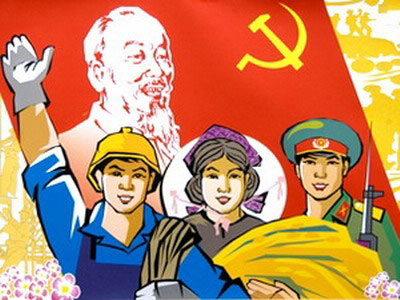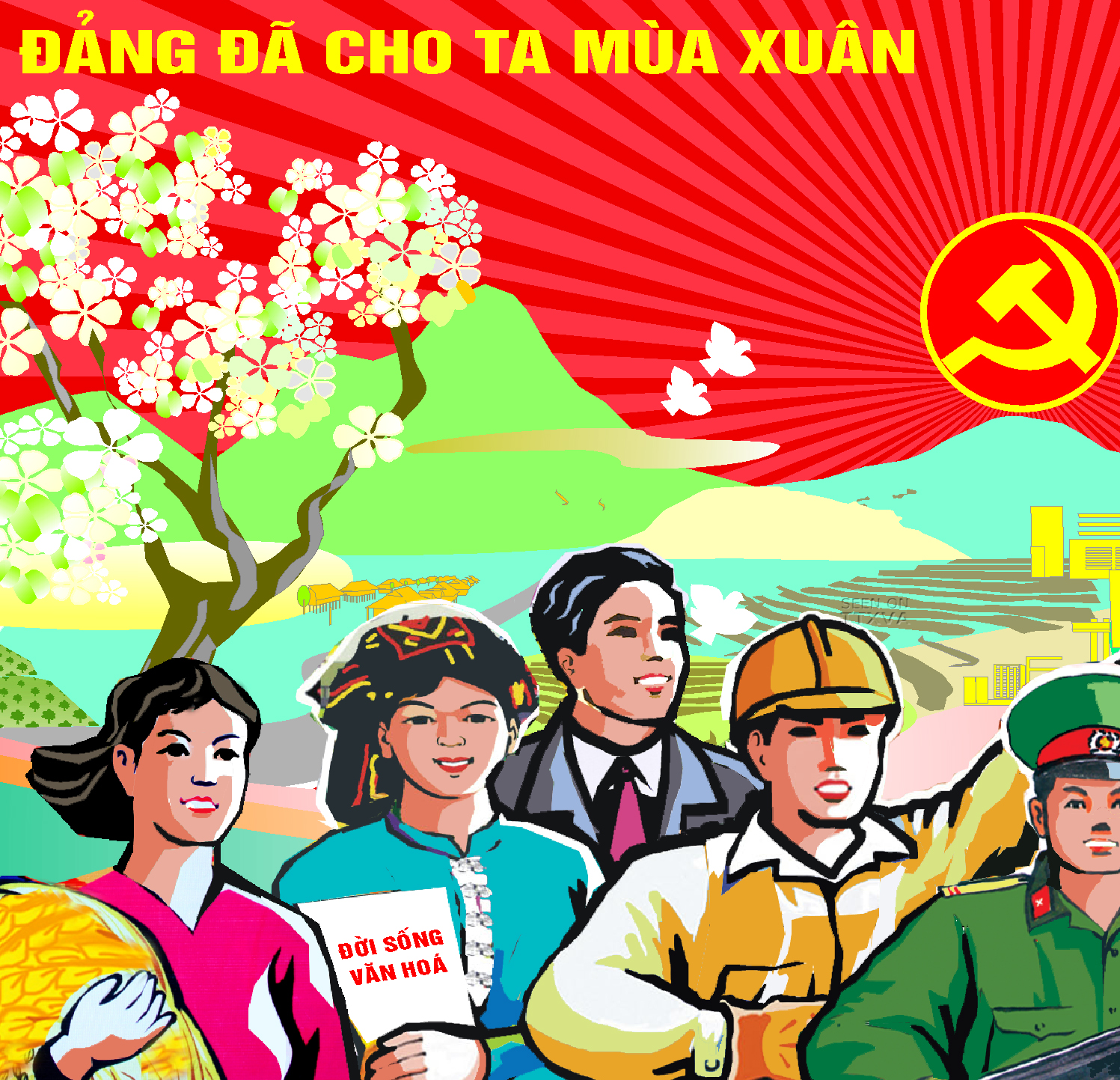
We have experienced thousands of New Year's Eves; some filled with the longing to escape a life of slavery and suffering; others burning with hatred, ready to fight against foreign invaders and liberate ourselves; still others filled with sorrow and longing for loved ones who left to answer the call of the nation and never returned; some brimming with faith in the future; and others filled with anxious waiting. A question arises: Why isn't success powerful enough to overcome all obstacles? What is the root of the problem?
Looking back, we see that our ancestors used a very simple yet effective method of evaluating and employing people, like using wood to shape a tree. Beyond academic qualifications, filial piety towards parents, fellow human beings, and ancestors were all highly valued virtues. In the past, those who passed their exams were appointed to official positions by the imperial court. Those with high marks were appointed to provincial or prefectural levels, those with lower marks to district levels, and those with top honors were appointed to ministerial positions such as Lang Trung, Thi Lang, or Thuong Thu. Essentially, they were assigned to lower-level positions, and then, through natural talent, they were promoted to higher ranks.
Today, we rotate cadres to grassroots levels for practical experience. Recently, to plan for cadre development from the strategic level down to the local level, leadership and management training courses have emerged to proactively create a pool of talent. Despite this systematic and thorough approach, many cases still arise where individuals are elected to positions of power and then sent to further education to accumulate specialized knowledge at various levels. However, the heavy workload and attractive nature of cadres leave little time for learning, and readily available bribes and kickbacks create new problems in this era of reform: a market for degrees and inflated grades. Furthermore, during each "turning point," those targeted for planning are concentrated for several months to enhance their knowledge and theoretical understanding. But it remains to be seen whether these training courses can truly "cleanse" them of the ingrained flaws stemming from their practical "contributions."

Looking abroad, there are many things we lack compared to them. For example, officials in other countries have a very high sense of self-respect. In political activities, they possess a remarkable political culture. When leaders realize they have shortcomings, flaws, or are no longer worthy of their assigned duties, they will resign. If they cause material or spiritual harm to the people and the country and do not resign, they will face the wrath of public opinion through media pressure and various other organizational pressures, ultimately forcing them to resign. It is said that the culture of resignation only exists when officials understand their duties and responsibilities with self-respect.
Vietnam is considered to have a traditional culture that values morality and honor, so why is resigning so difficult? Vietnamese officials view resignation as a very difficult decision. What will they do after resigning? Many officials only have leadership and management roles, which is a challenge. Furthermore, there's a significant sense of shame; how can someone who was once a prominent figure resign to seek a new job? It's not easy, as they feel both ashamed and unable to find suitable employment.In other countries, the resignation of officials does not have any negative consequences for their lives after leaving office.
Resignation is difficult because titles and positions are considered a "great" honor, a source of pride for family, clan, and village. In reality, titles and positions are merely a means of fulfilling one's duties as a human being, nothing more, nothing less. Another very real-life reason why no one wants to resign is that titles and positions are always linked to power, and power generates benefits. Even a simple reassignment or transfer, if it brings prestige but no benefit, will lead people to avoid it with countless seemingly reasonable excuses; without the ability to be selective, how can one feel happy?
Therefore, in our country, officials who make serious mistakes do not voluntarily resign. In the collective leadership mechanism, at most, they are transferred to a higher position (not demoted to the grassroots). Sometimes, they are simply asked to seriously learn from their mistakes. Some people complain that the "string of experience" seems endless; when mistakes are made, all levels, sectors, organizations, and officials seriously learn from them, yet it's never over. Please stop learning from mistakes and instead determine individual responsibility according to the assigned tasks. Punish those responsible for their mistakes strictly.While others only recognize individual responsibility before the law, we have collective responsibility, legal responsibility, and political responsibility. This is a rich variety of responsibilities, but their effectiveness is limited. Collective responsibility easily leads to complacency, and political responsibility is vague and general, making it difficult to assign blame to leaders. Within the realm of leadership and management, only individual responsibility before the law is practical and effective for the benefit of the people.
The socio-political environment is also making the door to resignation always locked and bolted, impossible and unwilling to open. Society should view resignation as normal, as a cultural norm, as a matter of character and self-respect, and should not discriminate against or despise it. The social environment needs to embrace the culture of resignation as a positive element, valuing character and self-respect, promoting progress, fairness, and social civilization.The culture of resignation is one of the most vivid, concrete, and practical manifestations of a political culture based on the dignity, self-respect, intelligence, and character of true leaders who both understand their duties and responsibilities and possess the courage to do so. This political culture is the opposite of a opportunistic political culture with people indifferent to their responsibilities, willing to cling to their positions at all costs, trampling on public opinion and even their own conscience. Without culture, how can there be light to guide the way? President Ho Chi Minh said, "Culture illuminates the path for the nation," but leaders must demonstrate culture themselves to contribute to making that culture illuminate the path for the people—in a broader sense.
We develop through culture, but the spiritual foundation of society is problematic, especially since a segment of the population, who have the power to influence social development, is experiencing moral degradation. This flaw hinders the advancement of education, science, and technology as top national priorities for national development. Consequently, our labor productivity is too low, failing to meet the demands of reality and the goals of our policies.
Thirty years of reform have passed, and the achievements both domestically and internationally are truly commendable. However, the shortcomings that have emerged during this period harbor immeasurable dangers to the nation's destiny. We recognize this and are working to overcome them, but the results have not been significant; in fact, the situation is becoming more complex. We know these shortcomings are urgent problems, yet we have not been able to address them urgently. Perhaps we have not yet recognized the root of the problem, the trends of the times, and the will of the people.
Exactly 70 years ago, the founder of the people's democratic republic in our country gave guidance."Whether Western or Eastern, we should learn from what is good to create a Vietnamese culture... with a purely Vietnamese spirit that is in harmony with the spirit of democracy." (newspaper National Salvation(1946).This viewpoint guided him to selectively learn from the best of the world, absorbing and enriching his own thought for the benefit of the nation. Even Marxism, a revolutionary doctrine born in his time and influenced by European practice, is merely a scientific theory whose greatest contribution is dialectics—a key to exploring the natural world and society. Other tenets, however, are not applicable in every era or every country. Each nation has its own unique historical and cultural characteristics. The path of a nation is shaped by its own national culture.

Through his engagement with the revolutionary theories of Marx, Engels, and Lenin, and drawing upon the history and culture of the Vietnamese nation, Ho Chi Minh supplemented his views on the possibility of social revolution in colonial countries. The practical experience of the national liberation revolution proved his innovative vision. Ho Chi Minh was unlike other disciples of his predecessors; a disciple who did not lose his national identity, who did not blindly follow dogma, and who only did what benefited the people, because the people are the foundation of the nation. When he said, "I am a patriot," it meant that his thinking and actions stemmed from the interests of the nation.
We must know, we must dare to recognize our own flaws so that we can overcome them. That is what is essential in life. Otherwise, we will mistakenly think we are healthy and carelessly ignore them. The most dangerous thing in life is deliberately considering ourselves without flaws, believing everything is perfect. In this sacred moment of New Year's Eve, I have been honest with myself, so I am incredibly peaceful and boundless in my enthusiasm as I step into the new spring with a new mission.
Today, building upon the successes of reform, perhaps we need to consider ways to change even more, to truly return to the revolutionary thought and methods of Ho Chi Minh, with the ultimate goal being the nation. The realities of the country and the times have changed considerably; it is time to liberate our intellect to gather creative thinking and perfect the path back to Ho Chi Minh's thought. Returning to his revolutionary thought and methods is returning to the vitality of the nation. Oh, our people! A new spring is arriving, brimming with the vibrant faith and hope of the people. May our nation experience another spring, a spring shared with humanity!
--------
Article published in the spring issue of Hanoi New Newspaper.
Author:Assoc. Prof. Dr. Pham Xuan Hang
Newer news
Older news